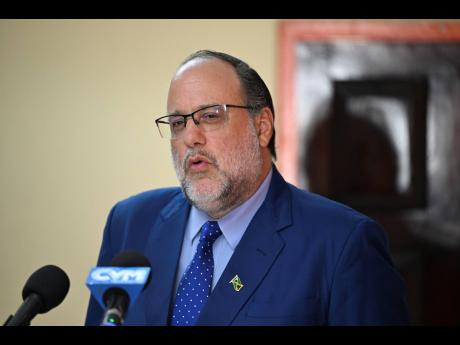Editorial | Race and the Constitution
It’s reprehensible that what should be a serious debate of who, under a reformed Constitution, should sit in Jamaica’s Parliament is now wallowing in a new bout of race-baiting against the opposition leader, Mark Golding.
Prime Minister Andrew Holness should call on his minister, and other senior members of the governing Jamaica Labour Party (JLP), the latest of whom is the deputy security minister, Juliet Cuthbert Flynn – to discontinue their reprise of the sobriquet ‘Massa Mark’, first deployed by Finance Minister Nigel Clarke, more than a year ago.
At the time, in the face of criticism, Dr Clarke attempted to hornswoggle Jamaicans into believing that his use of the phrase was intended to conjure Mr Golding’s attitude towards supporters of the JLP, rather than a reference to the race of the opposition leader, who is white. Few were convinced. For it is well known that the term ‘Massa’, when used in relation to white people, is generally intended to evoke notions of the people who wielded power over slaves in colonial Jamaica.
The dog-whistle shamefully resurfaced following the declaration last week by Mr Golding, who was born and raised in Jamaica, that he was personally in favour of all Jamaican citizens – even if of dual nationality, including of countries outside the Commonwealth – having the right to be parliamentarians.
He has been branded by critics as hypocritical for that position, given that his party has in the past outed, or instigated court cases against, MPs who were dual citizens of other countries, apart from those of the Commonwealth.
His critics highlight that Mr Golding holds UK citizenship by virtue of his father, Sir John Golding, a renowned orthopaedic surgeon, who made Jamaica his home. They claim that his stance is aimed at protecting his personal position.
Mr Golding, though, has stressed that he travels on a Jamaican passport and isn’t constitutionally required to renounce his British citizenship.
UNFORTUNATE
It is unfortunate, nonetheless, that the undertones of race have infected what ought to be a substantive conversation on the future of Jamaica’s legislative and executive governance at a time when constitutional reform is on the national agenda.
The Constitution (section 39(a)) allows anyone who is the citizen of a Commonwealth country and (section 39(b)) “ordinarily resident in Jamaica for the immediately preceding twelve months” to be appointed to the Senate or elected to the House of Representatives.
However, it disqualifies anyone (40 (2)(a)) “who is, by virtue of his own act, under any acknowledgement of allegiance, obedience or adherence to a foreign power or state”, which applied to a citizen of a non-Commonwealth country.
Given that prime ministers are chosen from among sitting MPs, this means that under the Constitution, as it now stands, a citizen of any Commonwealth country who has lived in the island for a year, could, if elected to Parliament, become the PM, once he or she is deemed by the governor general to be the member who (Section 70(1) “is best able to command the confidence of a majority of the members of that House”.
This is what happens in Britain, from which Jamaica adapted a Westminster-style political system, as well as in Canada, where after the 2017 general election 56 (approximately 17 per cent) of the MPs in the federal parliament were foreign born and 22 (6.5 per cent) held dual or triple citizenship.
On the other hand, Australia’s constitution bans “a subject or citizen of a foreign power” standing for Parliament. Indeed, in 2017 a seven-member panel of the country’s High Court, in upholding the provision, ejected the country’s then deputy prime minister, Barnaby Joyce, from parliament, as well as four senators. Mr Joyce’s ejection , for a time, cost Prime Minister Michael Turnbull’s Liberal Party-led government its one-seat majority in the federal parliament.
The court rejected Mr Joyce’s argument that he was exempt from the provision, having not done anything himself to acquire his New Zealand citizenship, which was inherited via a parent. He subsequently renounced his New Zealand status and re-entered Parliament – a development similar to what happened to several JLP politicians in the mid-2000s.
France’s approach is unique: its citizens living in large concentrations abroad vote for representatives in 11 ‘constituencies’ for their representatives in the national assembly. They also have representation in the Senate.
In the United States, anyone who has been a citizen of the country for seven years can be elected to Congress. The constitution, however, imposes the requirement of being “a natural born citizen” to be president – a matter whose interpretation has arisen in recent years, but not yet required resolution by the courts.
WORTHY OF DEBATE
Against the backdrop of the various requirements for legislative leadership around the world, Prime Minister Holness’ suggestion that “the ultimate executive leader of the country … should have no other citizenship”– thus precluding the leader’s ability to decamp to another jurisdiction if things go awry – is worthy of debate.
That, however, is not a constitutional requirement at this time. And, unfortunately, wasn’t deemed a matter urgent enough for the agenda of the fraught first phase of the current constitutional reform process. It can’t be arbitrarily imposed on any political leader.
But now that the PM has brought it up, maybe the Constitutional Reform Committee might wish to reopen its discussions to address the question.

